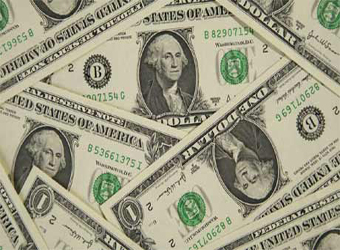The dollar held steady on Thursday but was set for a monthly loss against a basket of currencies as investors warily watch progress on U.S. tax reform legislation, while sterling stood tall on optimism a Brexit accord would be reached.
The dollar index, which gauges the greenback against a basket of six major rivals, was steady on the day at 93.151 but was down 1.5 percent for November.
The pound gained 0.5 percent to $1.3471 after rising as high as $1.3480, its highest since Sept. 26. It was up 1.4 percent for the month.
“Sterling caught a bid, and it seems to be related to Brexit,” said Bart Wakabayashi, branch manager for State Street Bank and Trust in Tokyo.
“It would be some positive news for the UK if they don’t have to pay as much than was thought initially,” he said.
On Wednesday, the British 10-year government bond suffered its biggest fall since June after media reports that said Britain would be willing to pay around 50 billion euros ($59.25 billion) to unblock stalled Brexit talks with the European Union.
The staggered progress of U.S. tax reform legislation overshadowed the impact of upbeat economic data on the dollar.
The U.S. economy grew faster than initially thought in the third quarter, data showed on Wednesday, notching its quickest pace in three years, as increases in business investment in inventories and equipment offset a moderation in consumer spending.
“Third-quarter GDP got revised up, and we also had consumer confidence the other day that was really great, a 17-year high,” said Jeff Kravetz, regional investment strategist at U.S. Bank Wealth Management.
“Aside from the good economic data, I think most investors are focused on the tax bill,” he said.
“If it does pass, that should give a lift to the dollar, because tax reform is what investors have been focused on for most of the year.”
Congressional Republicans scrambled on Wednesday to reformulate their tax bill to satisfy lawmakers worried about how much it would expand the federal deficit, as the measure moved toward a U.S. Senate floor vote later this week.
In otherwise mostly positive comments about the U.S. economy on Wednesday, outgoing Federal Reserve Chair Janet Yellen told Congressional leaders in her final scheduled testimony on Capitol Hill that the path of the federal debt “should keep people awake at night.”
The euro added 0.2 percent to $1.1864, poised to gain 1.9 percent for the month though shy of a two-month peak of $1.1961 scaled on Monday.
The dollar firmed 0.1 percent against the yen to 111.99, moving away from a 10-week low of 110.85 yen touched on Monday, though still down 1.5 percent for the month.
Investors continued to monitor tensions on the Korean peninsula after Pyongyang’s latest missile launch.
Speaking at an emergency U.N. Security Council meeting, U.S. ambassador Nikki Haley warned the North Korean leadership that it would be “utterly destroyed” if war were to break out.
The Australian dollar, often a proxy for China plays, rose 0.2 percent to $0.7585 after stronger-then-expected Chinese manufacturing activity in November.
China’s official survey of manufacturing activity (PMI) firmed to 51.8 in November, the 16th straight month of expansion.
The New Zealand dollar skidded 0.5 percent to $0.6847 after a survey of business sentiment plunged to an eight-year low in November as firms fretted about a change of government.
Bitcoin was up 8.1 percent at $10,614, a day after it stoked fears of a swelling bubble as it surged to a record high of $11,395. Source: Reuters
Source: Reuters


